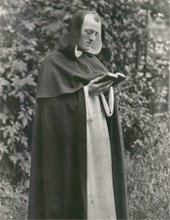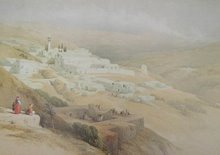.JPG)
This piece is self-explantory. Some McNabbian devotees visited his grave in the summer of 2006 and I was amongst them.
He lies in a rather bleak spot, interred amongst his brethren, his grave surrounded by those people of London whom he loved so well. The grave is but a small stone’s-throw from a dark and damp wall beyond which rumble trains heading Westwards - out of London - and Eastwards - into the stench. The grave stone and slab are new, replaced when some Dominican brothers were interred at the turn of the century.
A small but ardent band of pilgrims gather on a cloudy November afternoon to pray the Holy Rosary over him and his brothers, not so much for his sake - for we are, I think, all of one mind that he is in a very much better place than we - but for the souls of whichever poor and unprayed-for Catholics lie nearby and for his intentions. Now we know that Fr McNabb had no intentions save those of his Father in Heaven, but so multifarious and innumerable are the intentions of Almighty God that each man reflects only one part of them.
And those intentions of Almighty God that Fr McNabb reflected were the intentions for which we pray - for the family, for a sane and Catholic society, for greater love for Our Lord and Our Blessed Lady, for Christian justice for the poor.
The peace of our prayers is shattered each minute or two by a rattling train - sometimes the shallow Underground rumble, sometimes the high speed InterCity roar. Before us to the south and west line upon line of graves run to the dark wall beyond which lie the small pokey houses that had sometime around the Second World War replaced the scandalous tenement slum-blocks of McNabb’s day. To the south and west, the ground swells up to the horizon in sloping rows of newer gravestones. Save for this small ardent band praying at the foot of Fr Vincent’s grave few people are about this day. The Cemetery of St Mary’s, Kensal Green, is in places shockingly dilapidated and has the air of a forgotten place. Some cemeteries carry with them a well-tended air of peace and order. This cemetery is wilder, more broken, and overgrown with sad neglect. Our Paters and Aves feel choked with weeds despite the glistening new stone over which we pray. The clouds darken and the wind whips our orisons into our faces.
It is hard to imagine that day, 63 years ago now, when the good Father was laid into the cold earth, to join two of his recently deceased brothers. The throng that had followed the cortege from St Dominic‘s Priory - his simple deal coffin, daubed in Greek with “Lord, Thou knowest all things: Thou knowest if I love Thee” , carried upon a simple horse-drawn workman’s cart - that throng had been very great. Many people must have squeezed into the paths around the open grave, some pushed up against the wall beyond which then even as now trains rumbled, their dark smoke coiling lazily in the bright June air. Belloc was there, almost his last public appearance before his secluded twilight years, to see his confessor and friend lowered into the ground. But for Belloc, Father McNabb was more than that. The great Dominican had comforted Belloc in the darkest days of his life, after his wife, Elodie’s, death, when his Faith almost failed him; had encouraged him, almost ordered him, to keep writing to defend the Faith and Reason against the Modern Foe; had been his guide and - as GK Chesterton put it - ‘probably the only man who had any influence’ over Belloc in the later years of his life. As Belloc wrote in his obituary tribute of Father McNabb: “It would have been astonishing in any man to have discovered so profound a simplicity united to so huge a spiritual experience… Never have I seen or known anything on such a scale.”
McNabb was very properly interred in London soil. He would have had it no other way. His body has now at least in great part become one with the earth over which trod those to whom he ministered with such gentle fervour and fierce devotion.
Our Mysteries done, we turn and retrace our steps to the cemetery’s entrance, and return to our homes. This journey is filled with a special poignancy. Yes, today we lack someone of McNabb’s powers and Grace: we need friars - and priests - to preach as passionately as he did, and to match that glorious and holy rhetoric with actions of sublime charity. But the poignancy instead stems from the nature of the London through which we return home.
All ages have their vices. In that sense there has never been a truly Golden Age. But even McNabb would have recoiled - dumbstruck, I think - at the grotesque vices that are casually paraded across the capital, for all eyes to see clearly. Gross immodesty in dress; brazen homosexual behaviour; the manifest and squalid impurity of advertisements, of cinema, film and literature; the sexual vulgarity of language (the speech of the working man in particular has never been free of profanity, but the current sexual licence in speech, even from the young, would have appalled even the most robust navvy of McNabb’s day); the extraordinarily immature materialism; the surrender to naked capitalist and commercial banality, and to the culture not just of death but of emetic greed; the casual discourtesy at best and more usually bestial rudeness encouraged by ipods, mobile phones and the maddening paraphernalia of technological decay; and the grinning, cadaverous, Godless vapidity of the stuff with which the West seduces itself, day by day, and minute by minute, and second by second: - all of this would have rendered McNabb speechless and saddened to his tearful heart that afternoon in London.
We live amongst a declining, decadent, post Christian people, too deracinated and intoxicated with technological advancement and complete licence in matters of physical pleasure to even approach the lowest rungs of pagan dignity. Probably we are not - naturally - their betters in any respect. Only supernaturally has it been given us by God’s grace to see where we should aim, and to turn our eyes from the gutter to the stars.
Our lives must be like little flames amidst this hurricane of amoral, immoral, madness. So long as we are connected to God’s grace, and we do not sever that connection through Mortal Sin or apostasy, the light that is within us cannot be blown out no matter how wildly the winds rage, no matter how much light flickers and sometimes fades. When the world is fully dark, even a little light will seem a supernova.
Fr McNabb, pray for us!


2 comments:
And those intentions of Almighty God that Fr McNabb reflected were the intentions for which we pray - for the family, for a sane and Catholic society, for greater love for Our Lord and Our Blessed Lady, for Christian justice for the poor.
Amen!
I came here via the McNabb page on Facebook.
Apparently good things *can* be found through FB!
Yes indeed they can - although one has to be terribly discerning! ;-)
Post a Comment